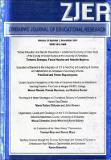| dc.contributor.author | Chikoore, Mavis Rufaro | |
| dc.contributor.author | Bowora, John | |
| dc.coverage.spatial | Zimbabwe. | en |
| dc.date.accessioned | 2015-11-30T20:54:57Z | |
| dc.date.available | 2015-11-30T20:54:57Z | |
| dc.date.issued | 2011-11 | |
| dc.identifier.citation | Chikoore, M.R. and Bowora, J., (2011) The impact of water shortages on educational delivery in selected schools in Harare East District, ZJER, vol. 23, no.3 (pp.259-276) UZ, Mt. Pleasant, Harare: HRRC. | en |
| dc.identifier.issn | 1013-3445 | |
| dc.identifier.uri | https://opendocs.ids.ac.uk/opendocs/handle/20.500.12413/7159 | |
| dc.description | A ZJER study on the impact of water shortages on educational delivery in selected schools in Harare East, Zimbabwe. | en |
| dc.description.abstract | The goal of the study was to investigate the impact of water shortages on educational delivery in selected schools in Harare East District. The population included school heads, teachers and pupils all drawn from selected schools of Harare East District. The sample consisted of five school heads, fifty teachers and one hundred pupils. Data was collected from school heads through semi-structured interviews. Questionnaires were administered to teachers. Group discussions were held with randomly selected pupils from the engaged schools. Direct observations were also done during the first half of the morning and afternoon sessions to establish the situation at the schools. The findings indicated that there was a high level of absenteeism and late coming by both teachers and pupils. A greater percentage of the teachers felt that the unavailability of water had serious effects on lesson delivery and general performance on practical subjects such as Home Economics, Agriculture and Science. It was observed that most of the schools had adopted a policy of ending each school day at break time for each session, because of water shortages. It was also observed that pupils were asked to bring water to school each day they came or else they would face the risk of being sent back home. It was recommended that the School Development Associations (SDAs), with the help from Ministry of Primary and Secondary Education as well as Non-Governmental Organisations (NGOs), should assist schools in their endeavours to ensure availability of clean water in their schools. | en |
| dc.language.iso | en | en |
| dc.publisher | Human Resource Research Centre (HRRC), University of Zimbabwe (UZ) | en |
| dc.rights.uri | http://creativecommons.org/licenses/by-nc-nd/3.0/ | en |
| dc.subject | Education | en |
| dc.subject | Water | en |
| dc.title | The impact of water shortages on educational delivery in selected schools in Harare East District | en |
| dc.type | Article | en |
| dc.rights.holder | University of Zimbabwe (UZ) | en |


